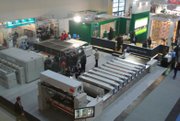Jantex Inks Deal to Distribute Digital Printers
Jan Springer, owner of Pico Rivera, Calif.–based printing-equipment supplier Jantex Inks & Beyond Inc. sees the future of textile printing coming via digital systems. With that in mind, the company has secured a distributorship with leading Italian printer manufacturer Reggiani Macchine, based in Grassobbio, Italy.
Reggiani has been at the forefront of industrial digital printing and markets the DReAM line, which is faster and more productive than traditional rotary-press machines as well as other digital printers. The system is also environmentally friendly because it eliminates the needs for screens, color-matching and ink waste.
Reggiani’s DReAM system can accommodate small to medium runs with the capability of up to 2,000 yards per day. Digital printing eliminates the use of screens, which need to be changed often and have a tendency to be misaligned. Digital systems use water-based dyes and are more environmentally friendly. The Reggiani machines come in widths from 68 to 134 inches and can print on almost all fabrics, including cotton, polyester and even leather. It works with reactive, acid, direct and sublimatic inks.
“I’m a traditional-inks person, but I see the writing on the wall. We’re in a changing market, and this part of the industry is going to change,” Springer said.
One of the main advantages of employing digital printing comes through speed-to-market and the ability to produce smaller runs more efficiently. Springer said that is especially important in California because many of the smaller companies deal with runs of 1,000 to 2,000 yards and have to wai t longer than larger companies. Jantex executives said one Reggiani machine can handle the capacity of five of its Mimaki machines.
From an industrial standpoint, the market for digital printing is very small and still in its infancy. DuPont rolled out its Artistri line a couple of years ago, but most of the digital processing has come through smaller machines that are not capable of doing production runs. They cost between $600,000 and $750,000.
Springer sees the system appealing to textile converters and California’s robust T-shirt market. In addition, she sees her customers as well as consumers opting for more green manufacturing.
“We’ve been moving away from the plastisols and certain types of oil- or solventbased printing inks,” she said.
Reggiani rep Paolo Torricella said Europe is becoming eco-conscious, as well. “In 2009, there will be a ban on all solvents,” he said.
For more information visit www.jantexinks.com. —Robert McAllister






















